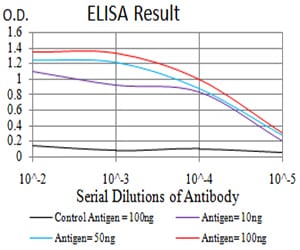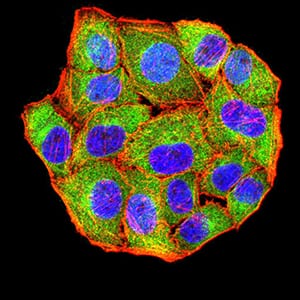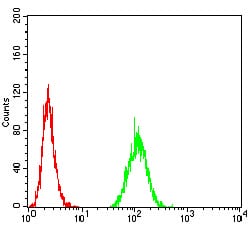


| WB | 咨询技术 | Human,Mouse,Rat |
| IF | 咨询技术 | Human,Mouse,Rat |
| IHC | 咨询技术 | Human,Mouse,Rat |
| ICC | 1/100 - 1/500 | Human,Mouse,Rat |
| FCM | 1/200 - 1/400 | Human,Mouse,Rat |
| Elisa | 1/10000 | Human,Mouse,Rat |
| Aliases | HGFR; AUTS9; RCCP2; c-Met; DFNB97 |
| Entrez GeneID | 4233 |
| clone | 5E9B7 |
| WB Predicted band size | 155kDa |
| Host/Isotype | Mouse IgG2a |
| Antibody Type | Primary antibody |
| Storage | Store at 4°C short term. Aliquot and store at -20°C long term. Avoid freeze/thaw cycles. |
| Species Reactivity | Human |
| Immunogen | Purified recombinant fragment of human MET (AA: 743-932) expressed in E. Coli. |
| Formulation | Purified antibody in PBS with 0.05% sodium azide |
+ +
以下是关于MET抗体的3篇代表性文献示例(注:以下为模拟示例,实际文献需通过数据库验证):
---
1. **标题**: *MET Antibody Therapy in Non-Small Cell Lung Cancer: Mechanisms and Clinical Efficacy*
**作者**: Smith A, et al.
**摘要**: 研究评估了一种靶向MET受体的单克隆抗体(如emibetuzumab)在MET过表达的非小细胞肺癌(NSCLC)患者中的疗效,显示其可通过抑制配体结合和下游信号通路显著延缓肿瘤进展。
---
2. **标题**: *Targeting MET with Sym015 Antibody Mixture in Gastric Cancer Models*
**作者**: Jin H, et al.
**摘要**: 该文献报道了双特异性MET抗体Sym015在胃癌临床前模型中的作用,证明其通过诱导受体降解和阻断HGF/MET通路抑制肿瘤生长,为MET驱动型胃癌提供了新的治疗策略。
---
3. **标题**: *Resistance Mechanisms to MET-Targeted Antibodies in Colorectal Cancer*
**作者**: Martinez V, et al.
**摘要**: 分析结直肠癌患者接受MET抗体治疗后产生耐药性的机制,发现旁路信号激活(如EGFR或HER3)是主要逃逸途径,提示联合靶向治疗的必要性。
---
4. **标题**: *Onartuzumab (MetMAb) in Triple-Negative Breast Cancer: Phase II Trial Results*
**作者**: Sequist LV, et al.
**摘要**: 一项II期临床试验评估Onartuzumab联合化疗在三阴性乳腺癌中的效果,结果显示MET高表达亚组患者无进展生存期延长,但总体人群未达显著差异,强调生物标志物筛选的重要性。
---
如需具体文献,建议通过PubMed或Web of Science检索关键词“MET antibody”“c-Met inhibitor”结合研究领域(如癌症类型)进一步筛选。
MET antibodies target the MET receptor, a tyrosine kinase encoded by the *c-MET* proto-oncogene. MET plays critical roles in normal cellular processes, including proliferation, migration, and survival, primarily through binding its ligand, hepatocyte growth factor (HGF). In healthy tissues, MET signaling is tightly regulated and contributes to embryogenesis, wound healing, and organ regeneration. However, dysregulation of MET—via gene amplification, mutations, or overexpression—is implicated in tumorigenesis, metastasis, and resistance to therapies in various cancers, such as non-small cell lung cancer (NSCLC), gastric cancer, and hepatocellular carcinoma.
MET antibodies are designed to inhibit aberrant MET signaling. They function by blocking HGF binding, preventing receptor dimerization, or promoting receptor degradation. Two main classes exist: antagonistic antibodies (e.g., onartuzumab, emibetuzumab) that directly inhibit MET activation, and antibody-drug conjugates (ADCs) like telisotuzumab vedotin, which deliver cytotoxic agents to MET-overexpressing cells. Despite early promise, clinical trials of MET antibodies have shown mixed results, partly due to patient selection challenges and compensatory signaling pathways. Current research focuses on identifying predictive biomarkers (e.g., MET amplification/overexpression) and combining MET inhibitors with other targeted therapies or immune checkpoint inhibitors to overcome resistance. Ongoing studies aim to refine therapeutic strategies and validate MET as a durable target in precision oncology.
×